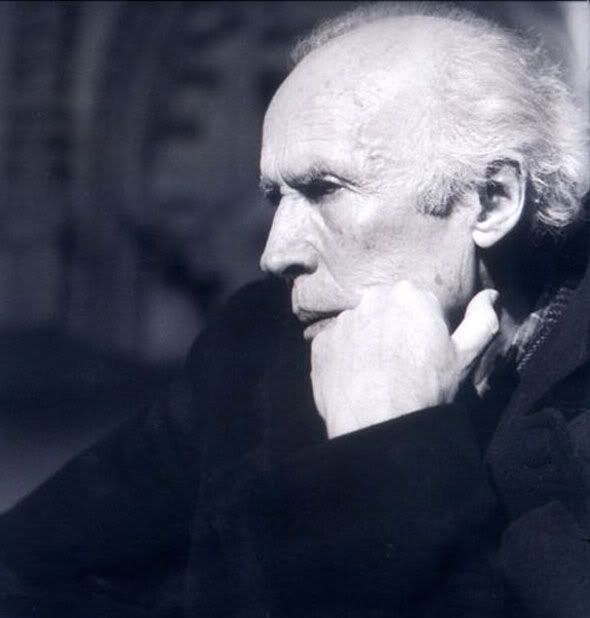
It is with great sadness I report that the French New Wave auteur Eric Rohmer has died at the age of 89. One of the greatest careers in the cinema has come to an end after 25 theatrical features and numerous short films, documentaries and TV productions. Rohmer's aesthetic, his reliance on subtle dialogue and restrained emotions, his seeming visual straightforwardness, has often led to him being misunderstood as a maker of boring talkfests. Even the BBC's obituary calls his work "completely devoid of action," as though he should have inserted more explosions or car chases into his patient, acutely observed films. As though Rohmer wasn't simply concerned with different kinds of action.
In fact, Rohmer was one of the most sensitive and intellectually probing of directors. He had an ear, not only for the way people talked, but for the ways in which their words related obliquely to their inner states. His films require careful attention and a willingness to read between the lines, to become attuned to the emotional and intellectual undercurrents of his scenarios. For Rohmer, as for many of his protagonists, life is something that should be considered and analyzed as well as simply experienced. Though he was not immune to sensual pleasures — the sand and water in Pauline at the Beach, the romantic interlude that opens A Winter's Tale, the lushly green park at the center of The Aviator's Wife — he was also always conscious of the multiplicity of thoughts and decisions that constitute human consciousness. His cinema was moral, but not moralistic; his parables are open-ended and ambiguous, suggesting that the decision, the judgment, belongs to the viewer alone.
In film after film, Rohmer returned to his favored topics, namely the formation, maintenance, and disintegration of love and relationships, ethics and spirituality, the natural world, the gap between thought and action, between imagination and reality. Many of his protagonists set out with an ideal in mind, seeking to make it real, and Rohmer both respects their determination and highlights their absurdity. Sometimes, these protagonists seek some seemingly unattainable romantic perfection, as in The Green Ray and countless other films, while in Perceval le gallois Rohmer's determined hero is a knight who clumsily integrates his ideals and theories with the real world. Rohmer's cinema, despite its unearned reputation for dreary chatter, could be funny, uplifting, deeply romantic, ironic, bittersweet, playful. He loved youth, and beauty. He loved love itself. He will be truly, sadly, missed.
I have not written as much as I would have liked about Rohmer here. He has long been one of my favorite directors, but as with other favorites I've watched and digested much of his work long before starting this site. I hope to write, in the coming weeks, about a few of his later films I haven't yet caught up with, as a way of saying goodbye to this cherished auteur. In the meantime, I direct you to my writeups of his Four Seasons cycle (A Tale Of Springtime, A Winter's Tale, A Summer's Tale, Autumn Tale), his uncharacteristic and delightful Perceval le Gallois, his historical spy thriller Triple Agent, and one of my favorites from his lengthy career, the charming The Aviator's Wife.
Also, for those who might see this as a reason to become acquainted, or reacquainted, with the work of this French master, might I suggest, in addition to some of the above, a few of his very finest films: Pauline at the Beach, My Night At Maud's, La collectionneuse, Claire's Knee and My Girlfriend's Boyfriend. The best way to honor Rohmer, and to remember him, is to watch his films.







0Awesome Comments!